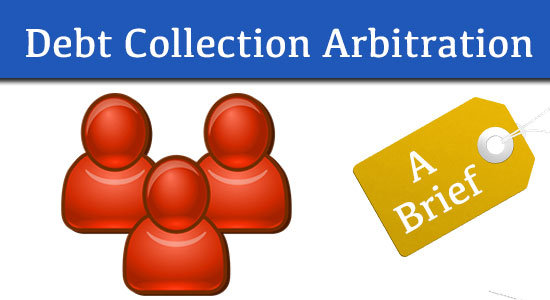If you fail to pay your bills, a creditor or debt collector may begin legal proceedings against you. Just in order to collect the unpaid debt, a debt collector may sue you in court. Again, if disputes are supposed to solve through arbitration as per your credit contract, debt collectors can even begin that process to try to collect the debt. In arbitration, both parties submit the dispute to an arbitrator (which is often a third party rather than a judge). Though arbitration is usually less formal than procedures take place in courts, the decision of an arbitrator is binding and enforceable in court.
Arbitration proceedings can be filed both on behalf of original creditor as well as debt collector who purchased the debt. Arbitration is a very significant financial occurrence. As per The Federal Trade Commission (FTC), a debtor should understand how debt collection arbitration works and about his/her rights. As per the FTC, a debtor should never enter into an agreement with a creditor without having proper knowledge about arbitration. Having the right knowledge about arbitration procedures can save you time, money and aggravation during the arbitration proceedings.
Whom do some disputes go to arbitration and not to courts?
Some contracts like credit card bills, cell phone bills and medical services usually require people to use arbitration to settle disputes. Therefore, whenever you purchase any goods or services, carefully read the TOU to see how disputes will be handled in future if there are any. If you want to keep your options open, always opt for a contract that doesn’t entertain the use of an arbitration or offers a provision so that you can decide to choose from a few option in case a dispute arises.
Who are the players?
Usually, the company that oversees and supervise an arbitration process is called a ‘forum’ or ‘provider’. The company appoints the arbitrators, schedules the phone calls and hearings, and manages coordination between the arbitrator and the parties until the dispute comes to an end. A forum is always impartial and never allowed to help you present your story or recommend you an attorney. Even in an arbitration you are not required to hire the services of a lawyer. But since arbitration is a legal proceeding and you have to face the consequences for long, you might think it a wise idea. If you want to hire the services of a lawyer, your local bar council could help you with the same.
How does arbitration procedure work?
If a debt collector want to begin an arbitration proceeding against you, he/she may send you an arbitration notice in mail or through any courier service. If you don’t understand what it’s all about, you can definitely call the collector or the arbitrator to know what it is all about. Since, often it’s not the original creditor who sends the notice, you get confused. In such a situation you can also get help from your lawyer.
Once you are involved in the thing, read and keep note of every documents. If you don’t understand anything, you can either ask your attorney or the forum for help. Make sure you keep a copy of every document you send to the forum. Again, make sure you do all communication in certified mail and request a return receipt.
There are some ‘protocols’ or ‘procedures’ those govern the arbitration process. Things like deadlines, obligations, and fees fall under these. Though these are all available in detail in the website of the forum, you can also ask your case manager for a copy. Also ask for a ‘fee schedule’, which details what fees each party must pay. If you are unable to bear your part, you may also ask for a fee waiver. Ask the forum to know how to apply for fee waivers.
Ask if there is an option to have an hearing in writing, by phone or by email. Often a written or phone hearing costs much less than an in-person hearing. Lastly, whatever evidence you submit in support of your case, the arbitrator’s decision is always binding.









